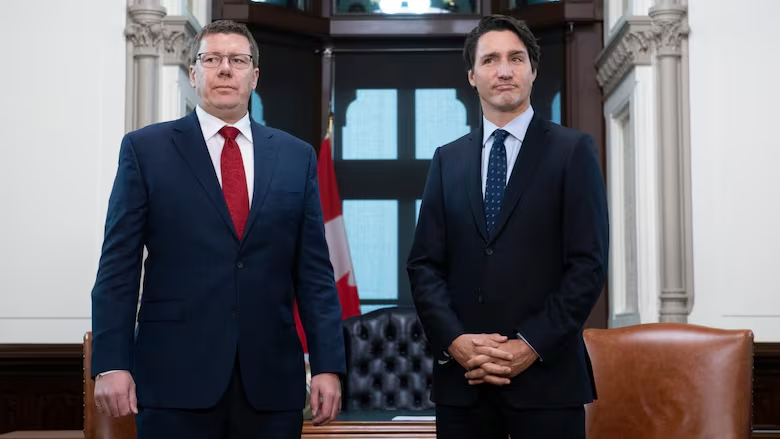Sask. Premier Moe 'disappointed' after meeting with Prime Minister Trudeau
Moe said no commitment on new pipelines, amendments to equalization formula

Saskatchewan Premier Scott Moe says he didn't hear any commitments on key issues related to the federal carbon tax or equalization after a meeting with Prime Minister Justin Trudeau.
On Tuesday, Moe and Trudeau met in Ottawa to talk about issues important to western Canadians, less than a month after the federal election.
"Disappointingly, after this meeting here today, what I do see is that we are going to see more of the same from this prime minister," Moe told reporters.
"We had provided some options for him to support to the people of the province. And today, I did not hear a commitment to moving forward on those items."
During the election, the federal Conservative Party won all 14 seats in Saskatchewan, including a riding once held by long-time Liberal MP and cabinet minister Ralph Goodale.
For the last month, Moe has been talking about increasing western alienation, fuelled by policies like the federal carbon tax.
Moe said he asked the prime minister for a one-year pause on the tax, so that Saskatchewan could have a chance to implement its own policies.
"[Saskatchewan's] policy is not about taxing hardworking Canadians and hardworking people in the province of Saskatchewan," said the premier.
"It's about reducing our emissions and enhancing our carbon sequestration opportunities."
Last year, SaskPower's carbon capture and storage facility at the coal-fired Boundary Dam power plant captured about 626,000 tonnes of carbon dioxide. The $1.5-billion facility opened in 2014.
In May, Saskatchewan filed an appeal to the Supreme Court of Canada over the carbon tax, which the province argued was unconstitutional.
The carbon tax was imposed on four provinces, including Saskatchewan, whose own carbon tax plans were deemed insufficient by the federal government.
.<a href="https://twitter.com/PremierScottMoe?ref_src=twsrc%5Etfw">@PremierScottMoe</a> and I sat down in Ottawa today to talk about our priorities. I’m committed to working together to keep fighting climate change, creating jobs, and making life more affordable for people in Saskatchewan and across Canada. <a href="https://t.co/P5J5Z38H1f">pic.twitter.com/P5J5Z38H1f</a>
—@JustinTrudeauMoe also asked Trudeau to reopen the country's equalization formula, where richer "have" provinces provide money to other areas that are not doing as well economically.
"Over the last five years, we have three provinces — Newfoundland, Saskatchewan and Alberta — that are at the bottom of our Canadian GDP growth rate," he said.
"Those are also three provinces that continue to contribute to this program. The program is flawed."
When asked if his comments were fuelling the nascent western separation movement, Moe said it should be up to the prime minister to cool down angry westerners.
"We have a prime minister that, on election night, said he understood those frustrations and he wanted to support the people in the province of Saskatchewan," said Moe.
"I came today to hear about what he was going to do differently to support the industries and the people in our province. And I can tell you this, I did not hear that there was going to be anything different."
Moe also called on Trudeau to commit to other pipeline projects to be built across the country, rather than solely rely on the Trans Mountain pipeline expansion, which is currently approved.
The province of Saskatchewan is expected to make its arguments at the Supreme Court of Canada in January.
NDP leader calls Moe's position 'dangerous'
Saskatchewan NDP Leader Ryan Meili said he too is disappointed, but the target of his criticism is the premier.
"He's doing something that's very dangerous. He's trying to give people this false hope that we can go it alone in a way that's actually going to harm the Saskatchewan economy," Meili said.
Meili said Moe is pushing Canada away, "with an all-or-nothing ultimatum approach" that has not advanced Saskatchewan's cause.
"He's trying to sow these seeds of separatism and it's very damaging to the fabric of the nation and he's doing it just for his own political gain. It's very embarrassing to see," Meili said.
With files from Adam Hunter

